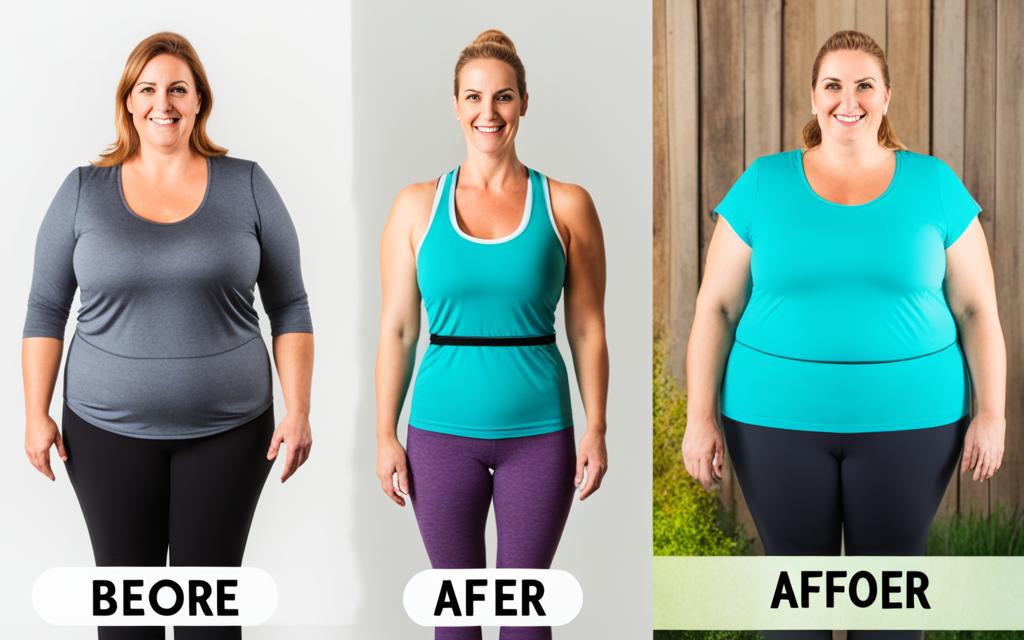How to Lose Weight: Effective Tips for Success
Starting a weight loss journey can feel overwhelming, but it’s a journey to better health and self-confidence. The secret to success is a balanced approach. This includes making smart food choices, exercising regularly, and changing your lifestyle for the better. Focus on building habits that last, not just quick fixes, for lasting weight loss success.
Whether you want to lose a few pounds or make a big change, knowing how to lose weight is key. It’s not just about eating less; it’s about feeding your body well, staying active, and building habits that help your overall health. With the right strategies and mindset, you can see lasting results and enjoy the process to a healthier life.
Key Takeaways
- Aim for a gradual weight loss of 1-2 pounds per week
- Create a balanced diet rich in fruits, vegetables, and lean proteins
- Incorporate both cardio and strength training exercises
- Stay hydrated and prioritize quality sleep
- Track your progress and seek support when needed
- Focus on sustainable lifestyle changes rather than fad diets
Understanding How to Lose Weight Fundamentals
Losing weight is a journey that starts with understanding key principles. Let’s explore the science behind weight loss and how to set yourself up for success.
The Science Behind Calorie Deficit
Weight loss is all about creating a calorie deficit. This means burning more calories than you eat. Your body then uses stored fat for energy. This process is linked to your metabolism, which affects how your body uses calories.
Setting Realistic Weight Loss Goals
Starting with achievable weight loss goals is key. Use your body mass index (BMI) as a guide. Aim to lose 5% of your current weight at first. Remember, losing weight takes time and patience.
| Weight Loss Rate | Calories per Week | Pounds per Month |
|---|---|---|
| Gradual | 3,500 | 1-2 |
| Moderate | 7,000 | 2-4 |
| Aggressive | 10,500 | 3-6 |
Importance of Sustainable Lifestyle Changes
Long-term success comes from lasting lifestyle changes. Quick fixes don’t work well. Instead, focus on healthy habits you can keep up with. This could mean eating better, moving more, and managing stress.
“The key to achieving and maintaining a healthy weight isn’t about short-term dietary changes. It’s about a lifestyle that includes healthy eating, regular physical activity, and balancing the number of calories you consume with the number of calories your body uses.”
Understanding these basics will help you start your weight loss journey. Remember, progress may be slow, but staying consistent is crucial for reaching your goals.
Nutrition Strategies for Weight Loss(How to Lose Weight)
Starting your weight loss journey with smart eating habits is key. A balanced diet, careful meal planning, and mindful eating can help you reach your goals.
Balanced meal planning
Make a balanced diet by dividing your plate into sections. Fill half with fruits and vegetables, a quarter with whole grains, and a quarter with lean protein. This way, you get all the essential nutrients and keep calories in check.
Portion control techniques
Mastering portion control is crucial for weight loss. Use measuring cups or a food scale to measure your servings accurately. A simple trick is to use smaller plates. This limits your portions and helps prevent overeating.
Incorporating nutrient-dense foods
Focus on nutrient-dense foods to fuel your body while cutting calories. Choose fresh fruits, vegetables, lean proteins, and whole grains. These foods give you essential vitamins and minerals without too many calories.
| Food Group | Examples | Benefits |
|---|---|---|
| Fruits | Berries, apples, citrus | Fiber, vitamins, antioxidants |
| Vegetables | Leafy greens, broccoli, carrots | Low-calorie, high-nutrient |
| Lean Proteins | Chicken, fish, tofu | Builds muscle, increases satiety |
| Whole Grains | Quinoa, brown rice, oats | Fiber, sustained energy |
Mindful eating practices
Practice mindful eating by slowing down and enjoying each bite. Pay attention to when you feel hungry or full. This helps prevent overeating and builds a healthier relationship with food.
“Mindful eating isn’t about being perfect, eating the right things, or never allowing yourself to eat on-the-go again. It’s about awareness and being present for each bite.” – Susan Albers, PsyD
How to Lose Weight Through Physical Activity
Physical activity is key to losing weight. A good exercise plan can burn calories, build muscle, and speed up your metabolism. Let’s look at ways to add exercise to your weight loss plan.(How to Lose Weight)
Cardio exercises are great for burning calories and keeping your heart healthy. Try to do at least 150 minutes of moderate-intensity cardio each week. This can be brisk walking, cycling, or swimming.
If you like intense workouts, go for 75 minutes of vigorous cardio. This includes running or HIIT sessions.
Strength training is also vital for losing weight. It helps build lean muscle, which can increase your resting metabolic rate. Do resistance exercises at least twice a week, focusing on all major muscle groups. You can use free weights, resistance bands, or your own body weight.
“Find activities you enjoy to maintain consistency in your active lifestyle.”
HIIT workouts are great for losing weight and are time-efficient. They involve short, intense exercise bursts followed by brief rest periods. This can help you burn more calories in less time. Start with one or two HIIT sessions a week and increase as you get fitter.
| Exercise Type | Weekly Frequency | Benefits |
|---|---|---|
| Cardio | 3-5 times | Burns calories, improves cardiovascular health |
| Strength Training | 2-3 times | Builds muscle, boosts metabolism |
| HIIT | 1-2 times | Efficient calorie burning, improves endurance |
Being consistent is important. Use fitness apps or wearables to track your progress and stay motivated. Pair your exercise with a healthy diet for the best weight loss results.
Lifestyle Habits to Support How to Lose Weight
Losing weight isn’t just about diet and exercise. Your daily habits are key to reaching and keeping a healthy weight. Let’s look at some important lifestyle changes that can help your weight loss journey.
Prioritizing Quality Sleep
Good sleep is vital for managing weight. Try to get 7-9 hours of restful sleep each night. A rested body helps control hunger hormones, which can reduce cravings and eating too much.
Stress Management Techniques
Too much stress can hurt your weight loss efforts. Here are some ways to manage stress:
- Deep breathing exercises
- Meditation
- Yoga
- Journaling
Staying Hydrated
Drinking enough water is crucial for weight loss. Aim for 8-10 glasses of water a day. Swap sugary drinks with water or unsweetened options to cut down on calories.
Building a Support Network
Having a strong support network can greatly help your weight loss journey. Be around people who support your healthy choices. Think about joining a weight loss group or working with a dietitian for tailored advice.
“The people you surround yourself with influence your behaviors, so choose friends who support your health goals.”
Make these lifestyle changes part of your daily life for a strong foundation in weight loss. Remember, small, steady steps can lead to big changes over time.
Conclusion
Getting to a healthy weight is a journey that needs a balanced approach. It’s about eating right, staying active, and making positive life changes. This mix helps build a strong base for lasting success. Remember, slow and steady wins the race when it comes to losing weight.(How to Lose Weight)
On your journey, be ready to adapt and be patient. Losing weight isn’t always smooth, and you might hit bumps along the way. Celebrate your small wins and health improvements. These victories keep you motivated and moving forward towards a healthier life.
Keep learning about nutrition and exercise to keep your progress going. Stay curious and open to new ideas that help your weight loss. By focusing on your health and making lasting choices, you’re setting yourself up for success in managing your weight.
Your journey to better health is unique. Don’t be afraid to ask for help from health experts who can give you advice that fits your needs. With hard work, patience, and the right support, you can reach your weight loss goals and live a healthier, happier life.
FAQ
How much weight can I expect to lose per week?
Aim to lose 1-2 pounds each week. This is a healthy pace. It comes from eating fewer calories by 500-750 daily.
What is a calorie deficit, and how do I achieve it?
A calorie deficit means you burn more calories than you eat. To get there, eat less and move more. Focus on eating nutrient-rich foods and staying active.
What should a balanced meal look like?
Your meal should have 50% fruits and veggies, 25% whole grains, and 25% lean protein. Choose foods high in fiber and avoid bad fats.
How much exercise do I need for weight loss?
You should do at least 150 minutes of moderate exercise or 75 minutes of hard exercise weekly. Also, do strength training twice a week.
How can I stay motivated throughout my weight loss journey?
Build a support network and track your progress. Celebrate your wins, big or small. Think about joining a group or seeing a professional for help.
What are some tips for managing stress and prioritizing sleep?
Use stress-busting methods like meditation, deep breathing, or yoga. Try to get 7-9 hours of good sleep each night to help with weight loss.
How can I avoid falling back into old habits?
Make your home a place that supports healthy eating and exercise. Plan your meals and be around positive people.



